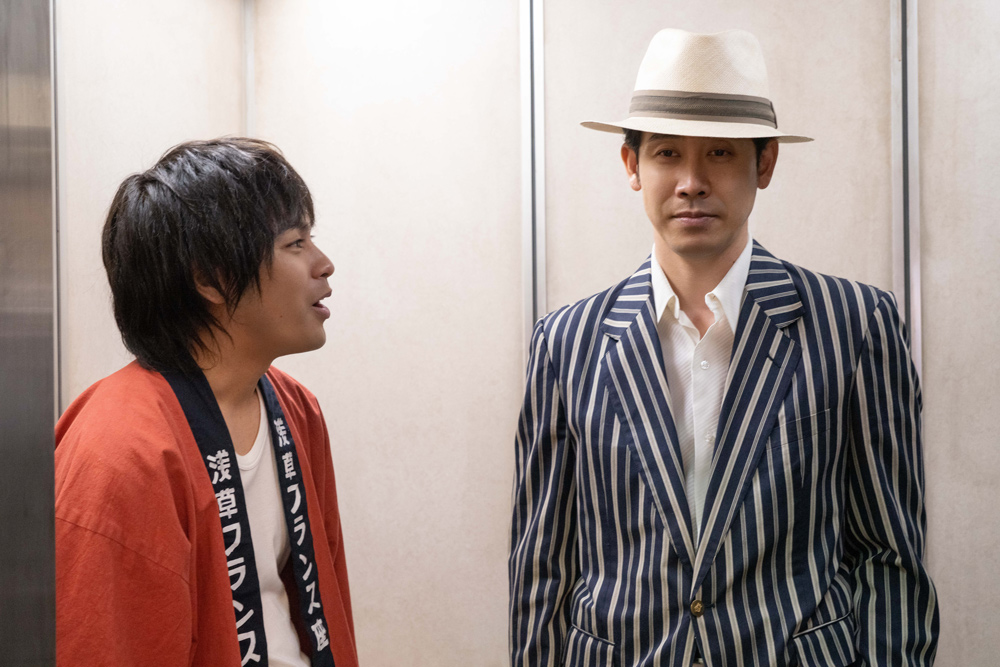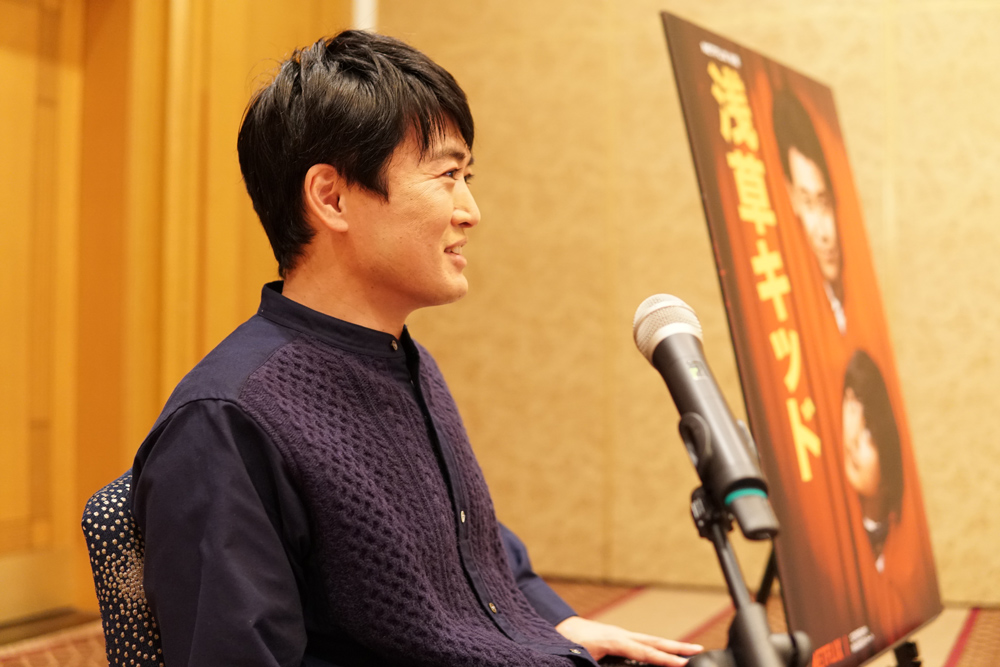!["Asakusa Kid" Theatrical Company Solo Director The story of Beat Takeshi and his master who has been longing for is made into a movie with his own script [Director's Interview Vol.168]](https://cinemore.jp/images/7dd116f6378a1fded5f0471e1dc7b75cb5be90220b6884bf42e584d07aba9c66.jpg)
"Asakusa Kid" Theatrical Company Solo Director The story of Beat Takeshi and his master who has been longing for is made into a movie with his own script [Director's Interview Vol.168]
The sex appeal of Hiroshi Oizumi who played Master Fukami
Q: One of the highlights of this work is the scene in which Mr. Oizumi performs a skit by the legendary comedian Sensaburo Fukami. How did you direct the skit back then?
Hitori: I asked Takeshi a lot about Master Fukami's skits, but Kinichi Hagimoto's talk was also very helpful. Before the coronavirus pandemic, I had the opportunity to meet the general (Kinichi Hagimoto) two or three times a year for work. At that time, I was already working on the script for ``Asakusa Kid,'' so I interviewed France-za and Master Fukami at the time.
There's a famous story about Master Fukami telling his disciples no good on stage, but that's kind of the story. That's why the general inherited that ism, and even in the 55th comedy, he was doing it in a story that said, ``No, don't do that!'' That's what I found out.
In the past, there was a drama adaptation of " Asakusa Kid " on TV, where they reenacted Master Fukami's skits, and Mr. Fukami got angry and said things like, "Don't just keep moving!" and "You came earlier!" ing. I had a feeling of discomfort there. Even if you do something like that, the audience won't laugh, so why would someone who is considered a genius comedian do something like that on stage? That's it. So when I heard the story from the general, I thought, ``Ah, that's what it's about'' and it made sense.
The material at that time only had a rough outline, but no clear lines had been decided upon. That's why I interpreted that Master Fukami was improvising and being rude to the other person and getting a laugh out of it. From there, writing the script became much easier. However, I still have a lot of scripts from the skits from back then, but it was difficult to do them exactly as they were. The content is quite extreme, with a lot of dirty jokes, and the script doesn't seem like a genius comedian (lol).

Netflix movie “Asakusa Kid” will be distributed exclusively worldwide from December 9th (Thursday)
Q: Did the director make various requests to Mr. Oizumi for the skit scenes? Is this how you want it to be played?
Alone: I asked, ``Mr. Oizumi, how can we make it easier?'' At first, I had them perform on set according to the script, but it wasn't quite right. So I asked, "What should I do?" and he said, "It would be easier if you fixed it like this." So they took a lunch break, during which I rewrote the script and had them do it after lunch. After that, it got a lot better. After all, Mr. Oizumi is someone who understands laughter, so I can rely on him.
Q: Is there any essence of Master Fukami that you conveyed to Mr. Oizumi as a director?
Hitori: In any case, it seems like he really used the phrase ``baka yarou'' as a punctuation mark, but there's a loving ``idiot,'' and there's an angry ``baka yarou.'' I asked them to use it wisely.
But I don't think I've ever given Mr. Oizumi anything negative. Just look cool. She's really fashionable, clumsy, kind, and full of sex appeal. I thought, ``Wow, this person will sell.'' They are expected to do more than what is expected of them, and as they earn their trust, they receive more and more work. I usually act in roles, so there were many things I could learn from.
Mr. Oizumi acted like that, so I think Master Fukami in heaven would be satisfied.

Screenplay/Director: Hitori Gekidan
Born in Chiba Prefecture in 1977. After debuting as a duo in 1993, they started their activities as a hitori theater company in 2000. While active in numerous variety shows, in 2006 he released his first novel, ``Saku in the Shadows'' (Gentosha). It became a bestseller, selling over 1 million copies, and was nominated for the Naoki Award and the Bookstore Award. Released in 2014, his first film as a director, ``A Thunder,'' won the 6th TAMA Film Award for Best New Director and the 24th Tokyo Sports Film Award for the Newcomer Award. In 2019, he will direct all 8 episodes of the drama “Beshari Living” (EX).
Interview and text: Tetsuya Inagaki
TV director. My personal goal is to realize a documentary project that depicts the obsessions of manga and movie creators. Programs he has directed in the past include ``The Godfather : The Man Who Revolutionized Manga'' (WOWOW), ``Takeshi's Birth: Master and Asakusa'' (NHK), ``Master and Disciple Story: The Encounter That Changed My Life'' [Masahiro Tanaka x Katsuya Nomura ] (NHK BS Premium).
Netflix movie “Asakusa Kid”
Exclusive worldwide distribution from December 9th (Thursday)

